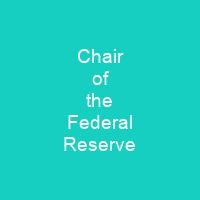Who is the Chairman of the Federal Reserve?
The chairman of the Board of Governors of the Federal Reserve System is like the captain of a mighty ship, guiding its course through turbulent economic waters. This individual serves as the head of the Federal Reserve and holds immense power in shaping America’s financial landscape. Nominated by the president and confirmed by the Senate, this role is no small feat; it requires not just political acumen but also deep knowledge of economics and finance.
The Role and Responsibilities
Imagine the chairman as a conductor leading an orchestra. They preside over meetings of the Board and have the authority to serve multiple terms, much like a seasoned maestro who can continue their work for years. Currently, Jerome Powell holds this position, having been nominated by President Donald Trump in 2017.
But what exactly does the chairman do? They lead the Federal Reserve’s analysis of both domestic and international financial developments, ensuring that America stays ahead in the global economic game. Think of them as a weather vane, always pointing to the best direction for the economy. They also supervise and regulate Federal Reserve Banks, making sure everything runs smoothly like a well-oiled machine.
Key Responsibilities
The chairman’s role is multifaceted. They exercise responsibility in the nation’s payments system, ensuring that money flows efficiently through the economy. It’s akin to keeping the veins of an organism healthy and functioning properly. Additionally, they administer consumer credit protection laws, safeguarding individuals from unfair financial practices.
Perhaps one of their most crucial roles is serving as the chair of the Federal Open Market Committee (FOMC). This committee sets short-term U.S. monetary policy, essentially deciding how much money should be in circulation to keep the economy stable and growing. It’s like a thermostat for the economy, ensuring it doesn’t overheat or freeze.
Reporting and Testifying
The chairman also has a significant role in reporting to Congress. Twice a year, they present on the Federal Reserve’s monetary policy objectives, providing transparency and accountability. This is akin to an open book, where everyone can see how the economy is being managed.
Moreover, they testify before Congress on numerous financial issues, ensuring that lawmakers are well-informed about economic matters. It’s like a bridge between the economic world and political decision-making, making sure both sides understand each other’s perspectives.
Conflict of Interest Laws
While the chairman wields significant power, they must also adhere to strict conflict of interest laws. This includes a ban on holding stocks in banks or being an officer or director of any bank. It’s like ensuring that no one can have both hands in the cookie jar; it maintains integrity and trust.
Salary and Compensation
The chairman earns a salary set by the Executive Schedule, which is quite generous but also necessary to attract top talent for such an important role. This ensures they are well-compensated for their responsibilities and can focus on the job without financial worries.

Conclusion
The chairman of the Federal Reserve is a pivotal figure in America’s economic landscape, guiding the nation through financial challenges and opportunities. Their role is complex yet essential, balancing policy-making with transparency and integrity. As we navigate the ever-changing world of finance, the chairman stands as a beacon, ensuring that our economy remains robust and resilient.
You want to know more about Chair of the Federal Reserve?
This page is based on the article Chair of the Federal Reserve published in Wikipedia (retrieved on December 8, 2024) and was automatically summarized using artificial intelligence.





